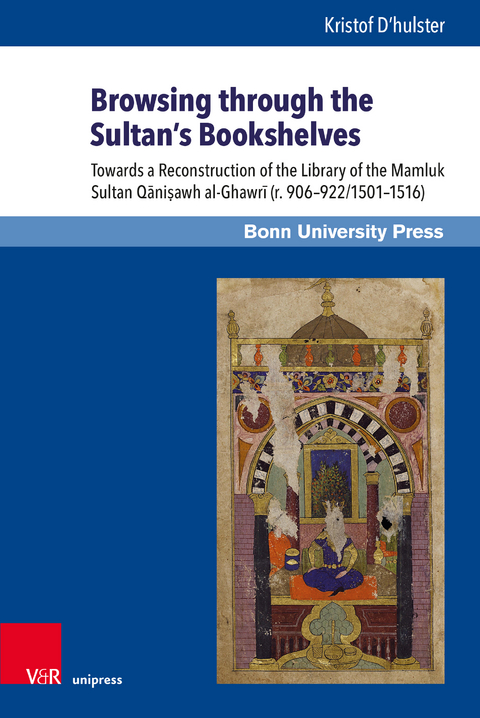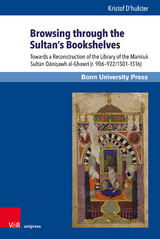Browsing through the Sultan’s Bookshelves
Towards a Reconstruction of the Library of the Mamluk Sultan Qāniṣawh al-Ghawrī (r. 906–922/1501–1516)
Seiten
2021
|
1. Edition 2021
V&R unipress (Verlag)
978-3-8471-1292-1 (ISBN)
V&R unipress (Verlag)
978-3-8471-1292-1 (ISBN)
Taking the daunting epistemic leap from browsing through books to reconstructing a library
Starting from 135 manuscripts that were once part of the library of the late Mamluk sultan Qanisawh al-Ghawri (r. 1501-1516), this book challenges the dominant narrative of a "post-court era", in which courts were increasingly marginalized in the field of adab. Rather than being the literary barren field that much of the Arabic and Arabic-centred sources, produced extra muros, would have us believe, it re-cognizes Qanisawh's court as a rich and vibrant literary site and a cosmopolitan hub in a burgeoning Turkic literary ecumene. It also re-centres the ruler himself within this court. No longer the passive object of panegyric or the source of patronage alone, Qanisawh has an authorial voice in his own right, one that is idiosyncratic yet in conversation with other voices. As such, while this book is first and foremost a book about books, it is one that consciously aspires to be more than that: a book about a library, and, ultimately, a book about the man behind the library, Qanisawh al-Ghawri.
Starting from 135 manuscripts that were once part of the library of the late Mamluk sultan Qanisawh al-Ghawri (r. 1501-1516), this book challenges the dominant narrative of a "post-court era", in which courts were increasingly marginalized in the field of adab. Rather than being the literary barren field that much of the Arabic and Arabic-centred sources, produced extra muros, would have us believe, it re-cognizes Qanisawh's court as a rich and vibrant literary site and a cosmopolitan hub in a burgeoning Turkic literary ecumene. It also re-centres the ruler himself within this court. No longer the passive object of panegyric or the source of patronage alone, Qanisawh has an authorial voice in his own right, one that is idiosyncratic yet in conversation with other voices. As such, while this book is first and foremost a book about books, it is one that consciously aspires to be more than that: a book about a library, and, ultimately, a book about the man behind the library, Qanisawh al-Ghawri.
Dr Kristof D’hulster engages with the cultural history of the pre- and early modern Islamic world, exploring processes of exchange, interaction and connectivity between the Turkic, Persian and Arab world.
| Erscheinungsdatum | 29.06.2021 |
|---|---|
| Reihe/Serie | Mamluk Studies ; Band 026 |
| Zusatzinfo | with 84 figures |
| Verlagsort | Göttingen |
| Sprache | englisch |
| Maße | 160 x 235 mm |
| Gewicht | 222 g |
| Themenwelt | Geschichte ► Allgemeine Geschichte ► Mittelalter |
| Geisteswissenschaften ► Geschichte ► Regional- / Ländergeschichte | |
| Geschichte ► Teilgebiete der Geschichte ► Kulturgeschichte | |
| Sozialwissenschaften ► Pädagogik ► Allgemeines / Lexika | |
| Schlagworte | Egypt • Mamluk-Kipchak • Mamluk Sultanate • Manuscript • medieval Mediterranean • Poet-King • Qanisawh al-Ghawri • Qāniṣawh al-Ghawrī • Qansuh al-Ghawri • Qānṣūh al-Ghawrī • Royal Library • Turkic Ecumene |
| ISBN-10 | 3-8471-1292-9 / 3847112929 |
| ISBN-13 | 978-3-8471-1292-1 / 9783847112921 |
| Zustand | Neuware |
| Haben Sie eine Frage zum Produkt? |
Mehr entdecken
aus dem Bereich
aus dem Bereich
eine neue Geschichte des Mittelalters
Buch | Hardcover (2023)
C.H.Beck (Verlag)
CHF 53,20




